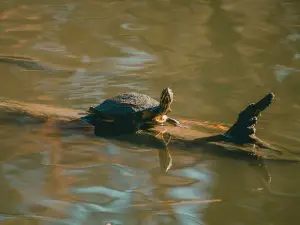
Your baby turtle is ever changing and ever growing, some changes will be normal and natural but some changes will not
If you’re worried about your baby turtles shell color fading to yellow then this article will help you out
Table of Contents
Baby turtle shell color fading yellow:
There are over 250 species of turtles on the planet and they look different from each other, some naturally have yellow shells.
But if your pet turtle shell suddenly starts fading to yellow then you’d understandably be concerned.
Here is why your baby turtle shell is fading to yellow:
Shedding:
If your little turtle’s shell is starting to fade from a darker color to a yellow then this may be happening because it’s almost time for the animal to start shedding.
Younger turtles tend to shed their scutes more often than older turtles do because they are growing quickly
The older scutes will be pushed outwards to make room for newer scutes to grow and this may make the older scutes look lighter, yellow, and faded like a translucent yellow.
What to do:
Shedding is normal for these animals and you’ll see more of this as the animal grows so you don’t have to worry, this is an important and necessary part of the animal’s growth.
You can help your pet by making sure that its environment is optimal especially while the animal sheds.
This means ensuring that the UVB light in the enclosure is working well and that the reptile is getting enough nutrient-rich foods while shedding.
Give the animal calcium and foods rich in vitamin E.
Shell rot:
Another reason why your baby turtle’s shell may be turning yellow may be that the little animal has shell rot.
This condition is common in aquatic turtles who spend a lot of time in the water.
Shell rot develops in your pet once bacteria make their way past the scutes and start to eat away at the flesh of the turtle under the scutes.
The color change is one of the first signs of shell rot in your pet, it may go unnoticed for a while. The color change may also be a white or green
In addition to the shell turning yellow, other signs of this condition in your pet include discharge coming from the carapace, a slime coating on the shell, spots of blotches on the shell, and soft divots or pits in the shell
The shell will eventually start to crumble and break off, and this will leave the tissue underneath exposed.
What to do:
If you catch the condition in its early stages then you can treat it at home. you can alternatively take your pet to the vet to get treatment.
Treating your pet at home involves cleaning your pet and dry docking it.
Start off by soaking your pet in warm salt water and then scrubbing the whole shell using a soft-bristled brush.
After this, you can thoroughly dry your pet with an absorbent, non-fiber towel or paper towel and then use betadine on the area only for 2-3 days as this medicine can inhibit shell growth in your baby turtle.
Dry dock your pet and only give it access to water for about an hour a day so the animal can eat and poop
If you enjoyed this article then you may also be interested in other turtle/tortoise related articles. Here are some articles that you may be interested in: Orange Spot On Tortoise Shell, Can Turtles Turn Around In Their Shell?, Why Is My Turtle Turning Orange And Red?, Why Is My Turtle Turning Orange?, Red-Eared Slider Orange Mouth, Turtle Shell Color Fading To Yellow

